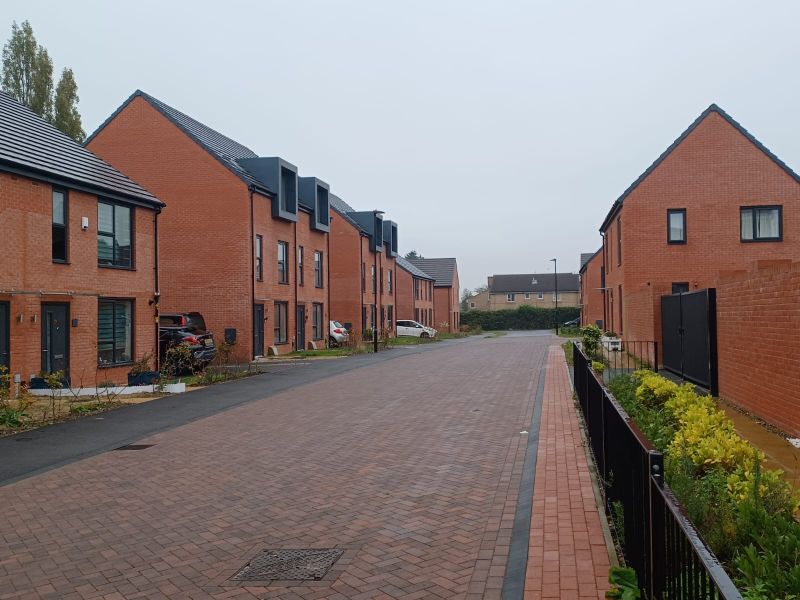The Environmental Audit Committee expects the Government to provide more detail on its plans to adapt the UK to climate change, as it publishes the Government’s response to its report on Heat Resilience and Sustainable Cooling.
In its report, the Committee cited findings that heat-related deaths could rise to 10,000 every year without concerted actions to adapt to the warming climate. It found that while the UK population spends on average 90% of its time indoors, the country’s housing stock is not designed to cope with excessive heat, and millions of UK homes experience summertime overheating.
With four out of five homes set to exist by 2050 having already been built, and the UK having some of the oldest housing stock in the world, the Committee recommended launching an ambitious and comprehensive national retrofit programme to adapt the UK’s houses for the demands of net zero. It recommended this be delivered via local authorities, be underpinned by long-term funding and prioritise vulnerable households.

In response, the Government falls short of committing to a retrofit programme on this scale. Ministers say that the Heat and Buildings Strategy, published in 2021, sets out the Government’s actions to reduce emissions from buildings, and point to recent announcements extending support in this area. The Government also says that it has made progress improving energy efficiency in homes, indicating that 48% of homes in England have now achieved an Energy Performance Certificate C level.
Meanwhile the Committee recommended that standards covering overheating in new buildings – Part O of the Building Regulations 2010 – should be extended to cover not just material changes of use but also refurbishment of existing properties. In its report, it recommended that Ministers set out whether the Government would pursue this, or if not, explain how the UK would achieve its commitments on global cooling.
The Government does not say whether it plans to extend these regulations. Ministers plan to use a call for evidence currently running to understand any potential problems with the Part O regulations, and to determine future updates.
Another of the Committee’s recommendations centered on nature-based solutions to climate change in urban areas, such as trees, parks and bodies of water, which have cooling effects alongside a host of co-benefits. In its 2023 Adaptation Progress Report, the Climate Change Committee also found that there was “no requirement for local authorities to protect or provide green space”, and that funding commitments were required to maintain parks and green spaces.
The Committee welcomed Natural England’s Green Infrastructure Framework (GIF), which is intended to help planners improve green space in urban areas, as a “welcome step forward”. It called for the Government to take action to expand urban green spaces, including by mandating local authorities to use the GIF and introducing a statutory requirement to protect green space.
However, the Government says local authorities are responsible for delivering new green areas and says it is currently not planning to mandate local authorities in urban areas to use the Green Infrastructure Framework, as the Committee had recommended.
In its report, the Committee had criticised the level of joint working across Government, but said that the new cross-government Climate Resilience Board could represent an important step forward. In response, the Government outlines the range of Government departments involved, with membership extending to “all climate risk-owning departments”.
Environmental Audit Committee Chair, Philip Dunne MP, said: “Extreme heat is already affecting health and livelihoods in the UK. While there is much to welcome in this response, there are still serious unanswered questions about how the Government plans to respond to a rapidly warming UK climate. This is frankly a missed opportunity.
“I am cheered to read further details of the Climate Resilience Board, which demonstrates exactly the kind of collaborative work across Government likely to be crucial in meeting the net zero challenge – a key theme in our committee’s work over the course of this Parliament.
“However, the Government has made no further commitment towards a national retrofit programme aimed at reducing the risks of overheating and improving energy efficiency. It has not for example added cooling measures to current programmes such as the Home Upgrade Grant scheme.
“Equally, Ministers have not answered our questions on whether building regulations on overheating will be extended to cover refurbishments. In my letter to the Secretary of State, I press the Government to provide more detailed information on its plans.
“Also lacking clarity at present is the Government’s approach towards protecting and enhancing green spaces. The Government insists that local authorities are responsible for this; however, as the Climate Change Committee has highlighted, serious funding pressures and the lack of a legal requirement for councils to take action mean that in reality, green infrastructure projects are unlikely to get off the ground.
“While this response falls short of what the Committee was seeking, these issues are of direct interest to colleagues across the House. I look forward to working with colleagues to secure further answers from the Government.”
Dr Radhika Khosla, Associate Professor at the Smith School of Enterprise and Environment, University of Oxford, who acted as Specialist Adviser for the EAC’s inquiry, said: “The Government’s response is a positive start - it demonstrates a recognition of the threat of extreme heat and details the existing steps in place to mitigate it. However, the levels of coordination, knowledge, and capacity building required for a rigorous National Heat Resilience and Sustainable Cooling Strategy are not yet in place. The proposed “cooling outlook document” provides a baseline but will require an integrated and strategic roadmap that is implementable. Looking ahead and recognising the threat of extreme heat and the existing measures that can help are important first steps, but there remains a lack of urgency and commitment to further action.
“Two gaps that require immediate attention are the need to hone in on overheating in existing buildings and retrofits, and the push to make the protection of green spaces, vital for passive cooling, a statutory requirement for local authorities. The Government notes that voters can take action “at the ballot box” if they feel their local authority is not doing enough in this regard. But, as the heatwave of 2022 demonstrated, extreme heat will not wait for electoral processes to complete before it has a devastating impact on population health and productivity. The Government’s response is an important first step, and hopefully one that leads to a sustainable and actionable heat resilience strategy for all.”
RIBA President Muyiwa Oki said: “Our buildings are not ready for extreme heat. The Government’s response to expert recommendations demonstrates they lack a clear plan to tackle the threat of rising temperatures.
“If we are to set the country on a sensible path to deliver more resilient buildings and communities, we must urgently bring forward a National Retrofit Strategy to futureproof millions of homes.
“Disappointingly, even simple and cost-effective solutions put forward by MPs, like reversing the decline of urban green space, have been ignored.
“But it’s not too late to heed these warnings. Whoever forms the next government must step up, work with the sector and embed resilience in our building stock.”




















